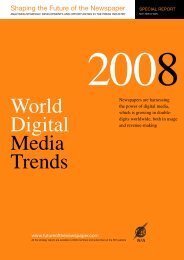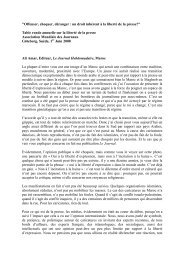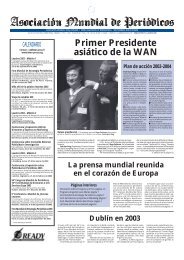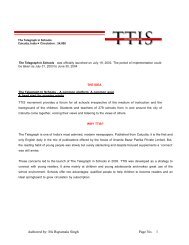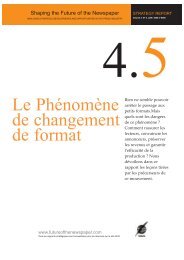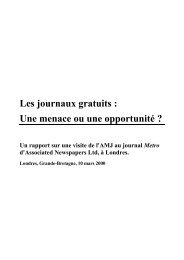United States <strong>of</strong> AmericaMedia General, a publisher <strong>of</strong> 25 daily newspapers in the southern United States, swung to apr<strong>of</strong>it in the first quarter but said stock-option expenses and lower pr<strong>of</strong>it in its publishingdivision <strong>of</strong>fset gains in its broadcast and Internet divisions, Reuters reported from New York.Net income for the quarter ended March 26 was $6.7 million, compared with a loss <strong>of</strong> $316.2million a year earlier, which included a one-time accounting charge <strong>of</strong> $325 million. Thecompany, which publishes The Tampa Tribune and owns 26 television stations, said revenuerose nearly 4 percent to $226.4 million. It recently agreed to buy four more NBC-owned and -operated TV stations for about $600 million. In its broadcast division, the company benefitedfrom $3.9 million in advertising revenue from the Winter Olympics. It previously saidOlympics revenue was 15.3 percent higher in 2006 than in 2002. Advertising for the SuperBowl, the U.S. football championship, on its three ABC stations also helped.http://www.iht.com/bin/print_ipub.php?file=/articles/2006/04/12/business/gannett.php; April13, 2006United States <strong>of</strong> AmericaFirst-quarter net income was cut in half at Knight Ridder Inc., the soon-to-be-sold newspaperchain that includes the Philadelphia Inquirer and Philadelphia Daily News. The chain that isbuying Knight Ridder, The McClatchy Co. (MNI) <strong>of</strong> Sacramento, Calif., plans to sell <strong>of</strong>f theInquirer, the Daily News and 10 other Knight Ridder papers because they are not in growingmarkets. In a statement, Knight Ridder Chairman Tony Ridder said a downturn in operatingpr<strong>of</strong>its was largely caused by "particularly weak" results at the Philadelphia papers and theAkron Beacon Journal. Knight Ridder said it was hurt by weak advertising at the trio <strong>of</strong>papers as well as costs associated with finding a buyer for the company, higher interestexpenses and costs for stock-based compensation. Knight Ridder <strong>of</strong> San Jose, Calif. -- whichis being sold for $4.5 billion in a deal that includes $2 billion in assumed debt -- said Mondayit earned $28.4 million, or 42 cents per share, down from $60.5 million, or 79 cents per sharein first-quarter 2005. The company said the 42 cents per-share figure included costs <strong>of</strong> 5 centsper share in stock-based compensation, and 6 cents per share in costs associated with findinga buyer. In the same period last year, the company saw 4 cents per share in pr<strong>of</strong>its frompapers in Detroit and Tallahassee, Fla., which the company doesn't own anymore. Revenuerose 3.9 percent to $739.9 million, although the result included three newspapers inWashington and Idaho that the company didn't own in the same period a year ago. A group <strong>of</strong>Philadelphia investors -- including Bruce Toll, vice chairman <strong>of</strong> home-builder Toll BrothersInc. (NYSE:TOL) <strong>of</strong> Bensalem, Pa. -- and Los Angeles-based investment firm Yucaipa Cos.are reportedly interested in buying the Philadelphia papers from McClatchy.http://philadelphia.bizjournals.com/philadelphia/stories/2006/04/17/daily9.html; April 17,2006United States <strong>of</strong> AmericaDow Jones & Co. Inc. said first-quarter earnings rose, helped by stronger advertising at TheWall Street Journal, its flagship newspaper, but results fell short <strong>of</strong> analysts' expectations.Net pr<strong>of</strong>it totaled $61.5 million, or 74 cents a share, compared with $8.2 million, or 10 cents ashare, a year earlier. Revenue rose 9.7 percent to $452.2 million. Excluding one-time items,quarterly pr<strong>of</strong>it rose to 14 cents per share from 11 cents a year ago. Analysts polled byReuters Estimates on average expected 16 cents a share. First-quarter earnings at thecompany, which also runs Dow Jones Newswires, Barron's, MarketWatch and the Ottawaycommunity newspapers, were lifted by stronger advertising at the Wall Street Journal.Advertising lineage at the U.S. Wall Street Journal, including Weekend Edition, increased10
14.9 percent. Ad sales at the unit rose 18 percent. While the company continues to battle highnewsprint expenses, it has also undertaken several cost-cutting measures in the past year.Chief Executive Richard Zannino, who took over the position earlier this year, has alreadychanged the company's structure and announced about 20 executive job cuts. The structuraloverhaul is expected to save about $14.5 million annually. The company has also redesignedits European and Asian editions <strong>of</strong> The Wall Street Journal, making them tabloid size to trimcosts. Looking ahead, the company said it expects second-quarter pr<strong>of</strong>it per share, excludingone-time items, to be in the low-to-mid 30 cents per share range, below analysts' averageestimate <strong>of</strong> 38 cents. Second-quarter pr<strong>of</strong>it will include losses <strong>of</strong> about 6 cents per share fromthe Weekend edition, 2 cents per share from interest expenses from a legal settlement, and 1cent per share from stock-based compensation.http://abcnews.go.com/Business/print?id=1854186; April 18, 2006United States <strong>of</strong> AmericaOn July 1, if all goes as planned, the McClatchy chain will swallow Knight Ridder andbecome the nation's second-largest newspaper company, with 32 dailies stretching fromMiami to Anchorage. Among the 20 newspapers it would acquire: The Olympian and TheBellingham Herald. The mammoth takeover would reshape the newspaper landscape,nationally and locally. It was a hot topic, at the podium and in the hallways, as the country'stop editors gathered Tuesday in Seattle for the annual convention <strong>of</strong> the American Society <strong>of</strong>Newspaper Editors. The transaction would push the number <strong>of</strong> daily papers McClatchy ownsin Washington from two to four, solidifying its position as the state's No. 2 newspaperpublisher in daily circulation. It also would give the Sacramento-based company a big stake inNo. 1: McClatchy would inherit Knight Ridder's 49.5 percent share in The Seattle Times Co.,which owns two Eastern Washington dailies in addition to its namesake. Altogether, nearly500,000 copies <strong>of</strong> newspapers in which McClatchy has an interest would fly <strong>of</strong>f Washingtonpresses each weekday. That's almost half the combined daily circulation <strong>of</strong> all the newspapersin the state. McClatchy <strong>of</strong>ficials aren't <strong>of</strong>fering many details about their plans while theKnight Ridder deal undergoes federal antitrust review. But, from what they have said,newspaper readers and advertisers probably won't notice much difference when the company'sNorthwest footprint expands. Robert Weil, the vice president who oversees McClatchy'sNorthwest operations, said last week there's no plan from Sacramento to consolidate anynews, advertising or production operations at its Washington newspapers. "The decisions areall going to be made locally," he said. "That's really a hallmark <strong>of</strong> McClatchy." Weil also saidMcClatchy intends to be "a passive, minority investor" in The Times Co., leavingmanagement decisions to the local Blethen family, owner <strong>of</strong> the remaining 50.5 percent.Knight Ridder Chief Executive Tony Ridder chafed in that role, contending the Blethensignored him, mismanaged the company and didn't make enough money. McClatchy and theBlethens, in contrast, are saying nice things about each other. "We really admire the Blethens.Family ownership is something we value," said Maloney, a major shareholder and great-greatgrandson<strong>of</strong> McClatchy's founder. McClatchy was founded 149 years ago by a disciple <strong>of</strong>newspaper pioneer Horace Greeley who came west during the California Gold Rush. He andhis descendants imbued their Central Valley newspapers with a passion for scrappy,enterprising journalism. McClatchy still enjoys a reputation for quality. "I have not known <strong>of</strong>a paper they acquired that they did not improve," said Ben Bagdikian, retired dean <strong>of</strong> theGraduate School <strong>of</strong> Journalism at the University <strong>of</strong> California, Berkeley. McClatchy wentpublic in 1988, following the lead <strong>of</strong> several other newspaper chains.http://seattletimes.nwsource.com/html/localnews/2002953673_mcclatchy26.html?syndication=rss11
- Page 1 and 2: SFN Flash March-June 2006Monthly up
- Page 3 and 4: Qassim, General Manager of the news
- Page 5 and 6: Schibsted, which owns the largest n
- Page 7 and 8: http://www.brandrepublic.com/bullet
- Page 9: for mobile content, putting us in t
- Page 13 and 14: shares, particularly because we con
- Page 15 and 16: FranceAxel Springer said it is mull
- Page 17 and 18: include both the employee’s and t
- Page 19 and 20: party's policy-making Central Stand
- Page 21 and 22: United KingdomThe Financial Times r
- Page 23 and 24: Search-engine-linked advertising co
- Page 25 and 26: GermanyHeads of Baden-Wuerttemberg
- Page 27 and 28: ZambiaThe overwhelming success of a
- Page 29 and 30: and, above all, "wanted," heralding
- Page 31 and 32: Khalifa to discuss the editorial pl
- Page 33 and 34: eaders who cannot, or are not willi
- Page 35 and 36: * * * * *Plans by Icelandic media h
- Page 37 and 38: advertisers. That’s why such a bu
- Page 39 and 40: are brands as well. They depend on
- Page 41 and 42: UkraineIn March, Dutch publisher TM
- Page 43 and 44: debate in the Forum. http://www.bra
- Page 45 and 46: eaders than traditional magazines.
- Page 47 and 48: channels (+8%) or even Internet por
- Page 49 and 50: Ilbo (21.2 percent), DongA Ilbo (19
- Page 51 and 52: status warned that they might destr
- Page 53 and 54: United Arab EmiratesIn December 200
- Page 55 and 56: last year but Fujitsu has shown a p
- Page 57 and 58: EDITORIAL CONTENTImage & Credibilit
- Page 59 and 60: http://www.redherring.com/Article.a
- Page 61 and 62:
WeddingsChinaMany newly-weds in Nan
- Page 63 and 64:
and editorial strategies with publi
- Page 65 and 66:
Vucinic believes the fratricidal co
- Page 67 and 68:
COPYRIGHTDigital Environment / Onli
- Page 69 and 70:
United States of AmericaAmerican me
- Page 71 and 72:
* * * * *Russia's state-run energy
- Page 73 and 74:
newspaper business. http://www.them
- Page 75 and 76:
Fair CompetitionKorea, Republic ofT





